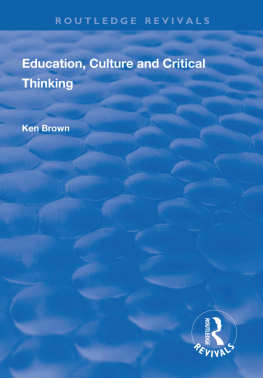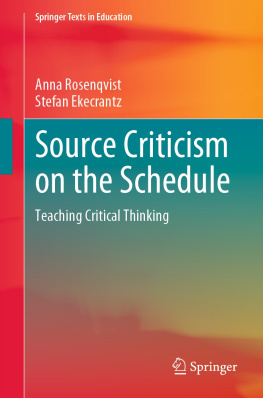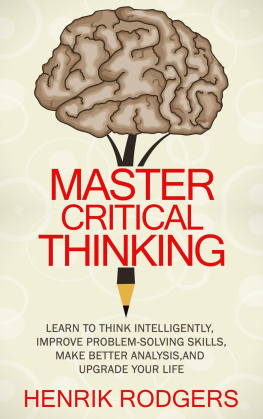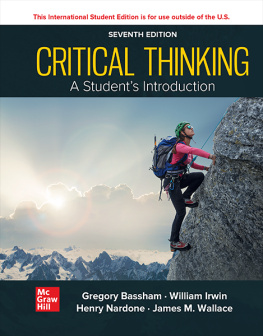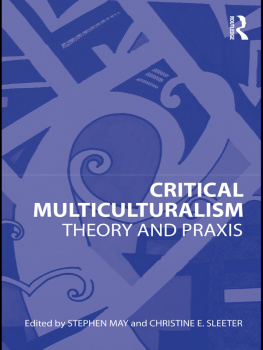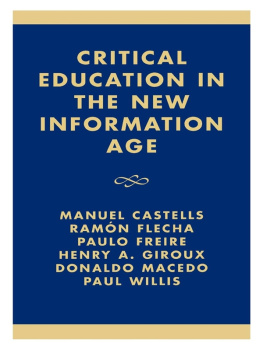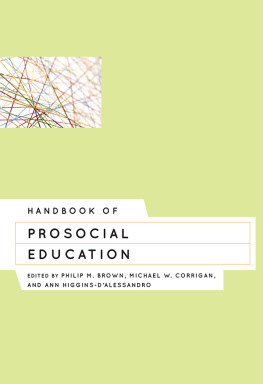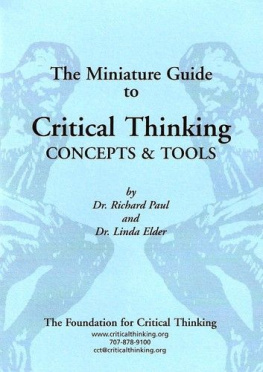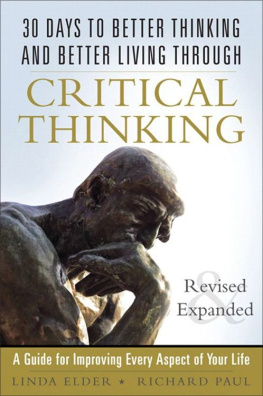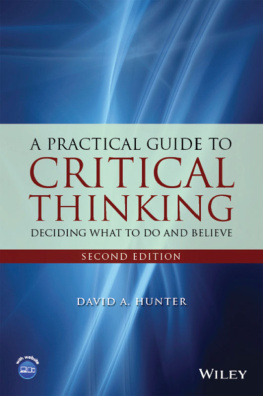EDUCATION, CULTURE AND CRITICAL THINKING
Education, Culture and Critical Thinking
Ken Brown
First published 1998 by Ashgate Publishing
Reissued 2018 by Routledge
2 Park Square, Milton Park, Abingdon, Oxon OX14 4RN
711 Third Avenue, New York, NY 10017, USA
Routledge is an imprint of the Taylor & Francis Group, an informa business
Copyright Ken Brown 1998
All rights reserved. No part of this book may be reprinted or reproduced or utilised in any form or by any electronic, mechanical, or other means, now known or hereafter invented, including photocopying and recording, or in any information storage or retrieval system, without permission in writing from the publishers.
Notice:
Product or corporate names may be trademarks or registered trademarks, and are used only for identification and explanation without intent to infringe.
Publisher's Note
The publisher has gone to great lengths to ensure the quality of this reprint but points out that some imperfections in the original copies may be apparent.
Disclaimer
The publisher has made every effort to trace copyright holders and welcomes correspondence from those they have been unable to contact.
A Library of Congress record exists under LC control number: 98073765
ISBN 13: 978-1-138-31271-5 (hbk)
ISBN 13: 978-1-138-31277-7 (pbk)
ISBN 13: 978-0-429-45802-6 (ebk)
A sense of crisis afflicts present-day education. Hardly a week goes by without the official announcement of new measures to raise standards, and it is now widely accepted that the responsibilities of central government encompass both the specification of general educational objectives and the fine detail of the curriculum. Despite its comparatively recent origins, our system of state-maintained schooling has become nearly definitive of both popular and professional concepts of education.
At the same time, concern about the apparent reliance of education systems on rote memorisation and their failure to produce significant numbers of incisive, analytical thinkers has spawned a variety of remedial programmes and a growing literature to support this effort. An international search is on for definitions to underpin strategies for the enhancement of student performance. However, some fundamental disagreements have emerged amongst exponents of teaching 'critical thinking' and there is a danger in the current climate that solutions will be prescribed while the nature of the problem remains obscure and controversial. Popular and official anxieties about educational standards, institutional pressures and inertias, and the demands of mass teaching have cashed themselves in the language of 'skills' and in obsession with predetermined educational targets. All this provides an impetus for the introduction of programmatic methods for remedying passive, rote learning which may well prove self-defeating.
'Critical thinking' has found its way into a proposed school-leaving examination syllabus as one of a number of 'core skills' to promote eventual workplace adaptability. The associated term, 'problem-solving' is already well established as one criterion of educational attainment despite an abundant literature displaying lack of consensus about its meaning. But such measures too neatly absolve educational institutions and governments of responsibilities for the 'thinking skills deficit'. To impose preconceived ideas of what constitutes critical thinking, or indeed knowledge and understanding, through the medium of programmatic curricula is to subvert the traditions of critical thought and to ignore vitally important questions about the purpose of educating people in free, democratic societies.
A conviction widely shared by contributors to the current debate is that critical thinking skills of a general nature not only can be identified but that they can be taught successfully. However, some confusion exists between the 'general', conceived as universal criteria of intelligibility and sound reasoning, and the 'foundational', understood as fundamental and generic processes of mind irrespective of the particular subjects to which they are applied. This latter interpretation seems to be a powerful influence in the present movement and is supported by a legacy of research in psychology, psycholinguistics and, more recently, cognitive science. A notorious problem is that putatively generalizable thinking skills fail the test of transferability between subject-matters; a failure in terms of the very meaning of this idea of generality.
Advocates of an alternative conception of critical thinking emphasise its subject- or domain-dependence. I examine these contrasting theoretical stances and relate them to a wider debate in philosophy and the social sciences about the significance of consciousness and intentionality in the interpretation of culture and behaviour, a perspective which accentuates social, interactional dimensions of thought.
Critical thinking, in any educationally meaningful sense, must be understood in historical and philosophical terms as exfoliations of a universal potential of language in social conditions of heightened dialogue and controversy. Its evolution has depended on institutionalised recognition of an individual right of inquiry and criticism which has clear democratic and libertarian implications. All human societies have displayed impressive problem solving abilities. Indeed, language and thought, even perception, are aiteriological. But the very universality of these abilities means that they do not help us to discriminate between different manifestations of human intelligence in a manner consistent with the identification of critical thinking as a significant educational desideratum. In this sense, it must be understood as specific to an historically limited range of cultures, none of which have enjoyed automatic guarantees of sustainability. My case is not that 'thinking skills' programmes will necessarily fail to produce results, though the notorious elusiveness of skill-transfer suggests that they may. Even if they succeed, the results will reflect arbitrary decisions about educational purpose which pay scant respect to the historical effort to transcend passive assimilation of traditional myth and dogma.
A theory of critical thinking which takes account of its historical origins and dialectical character provides more than the definition of an objective within the institutional apparatus of education. The critical traditions embody a sovereign principle, a criterion of the effectiveness of educational institutions to represent that legacy and the personal and social liberties in which they are enmeshed. This was the message articulated by John Stuart Mill throughout his lifetime; a comprehensive theory of critical thinking, liberation and personal empowerment, comprehensively overlooked in the present scramble for higher educational standards and, indeed, by the present 'thinking skills movement'.
Modern education is all cram...The world already knows everything, and has only to tell it to its children, who, on their part, have only to hear, and lay it to rote (not to heart ). Any purpose, any idea of training the mind itself, has gone out of the world. Nor can I yet perceive many symptoms of amendment. Those who dislike what is taught, mostly...dislike it, not for being cram, but for being other people's cram, and not theirs. Were they the teachers, they would teach different doctrines, but they would teach them as doctrines, not as subjects for impartial inquiry...Is it any wonder that, thus educated, we should decline in genius? That the ten centuries of England or France cannot produce as many illustrious names as the hundred and fifty years of little Greece? (John Stuart Mill, letter to the Monthly Repository, October 1832, 'On Genius')


